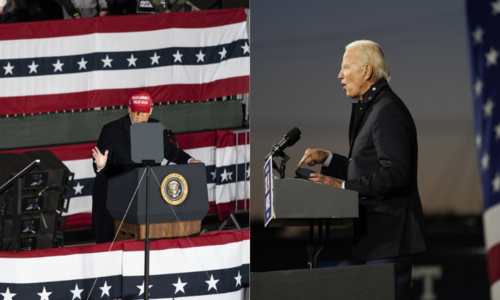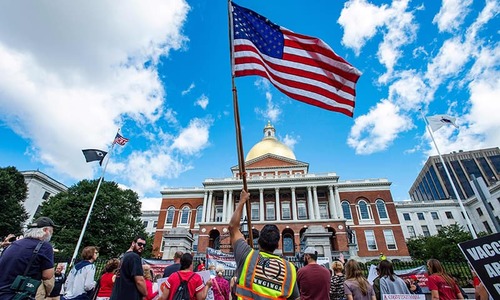IN one of the most consequential elections in America’s recent history, the presidential contest between Donald Trump and Joe Biden has been mired in fierce contention and acrimony. Apart from the charged environment in which the campaign is taking place, legal challenges to voting procedures have been mounting in many states — a portent of the political turbulence that may lie ahead.
Just two weeks away, the election is being viewed with rising concern in the US and beyond over whether its outcome will produce an orderly transfer of power or become bogged down in long drawn legal battles, strife and even violence. The world watches with dismay and bewilderment at the spectacle of American democracy and institutions being undermined in the election tussle. With the country deeply polarised, political consensus over the integrity of the electoral process has eroded to such an extent that it may risk delegitimising the election outcome itself.
So far, the Democratic contender Joe Biden is leading in all the national polls. But the race is still close in the battleground or swing states which have greater political weight given America’s electoral college method of electing the president. A key question is whether in this election too, the winning candidate will secure more electoral college votes but lose the popular vote. This is what transpired in the previous election when Hilary Clinton won the popular vote but Trump received the requisite electoral college votes to be declared the winner.
Unprecedented uncertainty characterises the environment in which the election is taking place. The coronavirus pandemic has injected many unknowns into the election and how it would impact polling especially voter turnout. Record use of postal ballots rather than in-person votes is being forecast, and already being witnessed in the early voting process. But the uncertainty this has triggered is whether the election infrastructure in many states has the capacity and resources to deal with millions of mail-in votes. That would also mean the electoral verdict could take days, even longer, to compute so that the outcome may not emerge on election night.
Will the outcome produce an orderly transfer of power or lead to legal battles and strife?
This points to a danger being widely discussed in American political circles — of an aspirant declaring himself the winner on polling day when postal votes have yet to be fully counted, which could be decisive to the outcome. Trump has constantly questioned postal ballots assuming they would advantage the Democrats. Describing mail-in votes as a “corrupt disaster”, he has suggested they would be used fraudulently to favour Biden.
Perhaps the greatest election uncertainty has been fuelled by Trump’s assertions that he may not accept the result if he loses and raising doubts about the election’s integrity. Although he started alleging foul play months ago, Democrats too have been questioning the election’s credibility, accusing Republican-run states of trying to suppress the vote. Meanwhile legal teams of both parties have been stepping up challenges to election rules across the country.
A record number of legal fights are in progress especially in battleground states. As a report in the Wall Street Journal pointed out, “In some key states, lawsuits that could affect turnout and outcomes in races across the ballot are making their way through the court hierarchy and could land at the US Supreme Court.” Exacerbating this situation have been deliberate cuts in federal funding for the US Postal Service with Trump acknowledging unabashedly that he is doing this to restrict mail-in votes. Democrats have predictably accused him of voter suppression.
Against this fraught backdrop the election outcome might well be disputed. Several possibilities are being speculated by American election analysts. If the result is a decisive victory for any candidate that would arguably minimise chances of a challenge. But if the result is a narrow one, legal battles may ensue and could go to the US Supreme Court, leaving the country in limbo until the dispute is resolved. While the election dispute in Florida went to the Supreme Court in the 2000 presidential race between George W. Bush and Al Gore, the latter accepted the verdict and conceded defeat. It is far from certain how it could play out this time.
A significant disconnect between the popular and the electoral college vote may also serve to delegitimise the election for supporters of the candidate who wins the popular vote by a large margin but loses in the electoral college. This will not be the first time for the popular and electoral college vote to vary but in the prevailing climate it could have a different political impact.
A grimmer scenario is also possible, as indicated by Trump’s assertions, which have fuelled much speculation in the country’s media. In this, Biden wins by a handsome margin but Trump refuses to concede and challenges the outcome, alleging voter fraud. He has made ominous statements calling for ‘election squads’ to monitor the vote to “watch all the thieving, stealing and robbing”. In the first presidential debate Trump urged a far-right group and his supporters to be ready, ostensibly to prevent ballot fraud. This is heightening tensions and more dangerously leading to attempts by right-wing militia groups to intimidate voters.
Actions by right-wing vigilantes and white supremist groups — encouraged by Trump’s stance — can provoke election chaos. This acquires greater significance in view of the fact that American security agencies now see armed white supremist groups as among the most lethal threats to the country. In Congressional testimony last month, the FBI director warned that “racially motivated violent extremism,” principally from white supremacists, represented “the majority of domestic terrorism threats”.
All this adds up to an election and its aftermath fraught with the risk of America’s descent into prolonged turmoil and instability — a situation succinctly summed up by Frank Bruni in a New York Times op-ed: “This country, already uncivil, is on the precipice of being ungovernable, because its institutions are being so profoundly degraded, because its partisanship is so all-consuming, and because Trump, who rode those trends to power, is now turbocharging them to drive America into the ground.”
The implications for the world of protracted instability in the US are considerable and will be discussed in a later column.
The writer is a former ambassador to the US, UK and UN.
Published in Dawn, October 19th, 2020














































